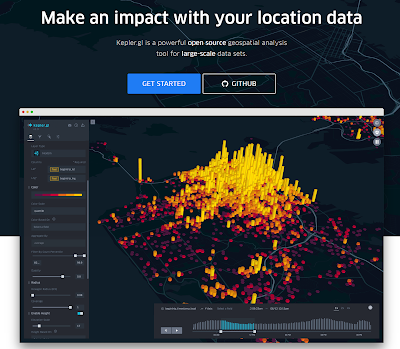データ分析に関する備忘録。主にR言語を使ったデータの前処理や統計、機械学習などの方法を記録。ビッククエリとトレジャーデータがお気に入り。オフラインとオンラインの連携が最近のマイブーム。
注目の投稿
【kepler.gl】コロナ対策による人流の変化も地図上に可視化(各種メディアで報道)
kepler.glのサイト画面 kepler.glを使ってコロナ対策の効果を分析したところ、テレビ、新聞、ネットのメディアから問い合わせや報道依頼が殺到。今も、土日返上で都内や全国の人流変化を分析しています。この記事では人流変化の可視化に便利なkepler.glにつ...

2016年5月24日火曜日
【学会】Workshop on Communicating Intentions in Human-Robot Interaction
Workshop on Communicating Intentions in Human-Robot Interaction のお知らせ
August 31, 2016
Columbia University, New York
http://www.intentions.xyz/roman-2016-workshop/
Submission deadline: June 24, 2016 (23:59 PST)
===================================================
Call for papers
Workshop on Communicating Intentions in Human-Robot Interaction
August 31, 2016
in conjunction with
IEEE International Symposium on Robot and Human
Interactive Communication (RO-MAN 2016)
August 26-31, 2016
Columbia University, New York
===================================================
---[Dates]---
Submission deadline: June 24, 2016 (23:59 PST)
Notification of acceptance: July 8, 2016
Workshop date: August 31, 2016
---[Background and motivation]---
Research in the cognitive sciences, in particular social neuroscience, has in recent
years made substantial progress in elucidating the mechanisms underlying the
recognition and communication of intentions in natural human-human social interactions
and in developing computational models of these mechanisms. However, there is
much less research on the mechanisms underlying the human interpretation of
the behavior of artifacts, such as robots or automated vehicles, and the attribution
of intentions to such systems.
Furthermore, robots’ recognition of human intentions is arguably a prerequisite
for pro-social behavior, and necessary to engage in, for instance, instrumental
helping or mutual collaboration. To develop robots that can interact naturally
and effectively with people therefore requires the creation of systems that can
perceive and comprehend intentions in other agents.
For research on social interactions between humans and robots/agents in general,
and mutual recognition/communication of intentions in particular, it is therefore
important to be clear about the theoretical framework and inherent assumptions
underlying technological implementations. This also has ramifications for the evaluation
of the quality of human-robot interactions.
Overall, the role of intentions in human-robot interaction very much remains an active
and growing research area in which further development is necessary, and the purpose
of this workshop is to advance the state of the art in that respect. The intended audience
consists of researchers from robotics, AI and the cognitive sciences. The focus is on
interdisciplinary interaction.
---[Workshop Content]---
The workshop will be centered around three main activities:
(i) keynote presentations to highlight the overall state of the art;
(ii) paper presentations that deal with specific aspects of the work carried out
by workshop participants;
(iii) a round-table discussion that will allow all participants to contribute their thoughts
on the open and most pressing research challenges.
---[Scope]---
Suitable topics for the workshop address intention communication in Human-Robot Interaction;
for instance:
* mechanisms of intention communication in Human-Robot interaction;
* machine recognition of human intentions;
* human recognition/attribution of robot intentions;
* implications for the evaluation of HRI.
We particularly encourage papers that consider mutual
recognition/communication of intentions (i.e. that consider
both human recognition of robot intentions and robot recognition
of human intentions in given application contexts), but will
also consider papers that deal with uni-directional intention
recognition/communication. Papers can be pure position
papers, or can substantiate their message with empirical work.
Papers will be peer-reviewed and we emphasize that papers must make an
interesting, relevant, and novel contribution (whether theoretical or
empirical) to the state of the art.
---[Submission Instructions]---
We expect papers to be 4 - 8 pages using the IEEE conference templates
(available at
http://www.ieee.org/conferences_events/conferences/publishing/templates.html).
Please e-mail your paper to tom.ziemke@his.se <mailto:tom.ziemke@his.se>, serge.thill@his.se <mailto:serge.thill@his.se> and
alberto.montebelli@his.se <mailto:alberto.montebelli@his.se> by the submission deadline.
---[Publication]---
Preliminary proceedings will be published in the "Skövde University
Studies in Informatics" series (ISSN 1653-2325). Authors have the right
to opt out of these proceedings. We will further organize a Frontiers
(in Neurorobotics) research topic as a venue for extended papers on the
themes of the workshop.
---[Website]---
News and updates will be available at:
http://www.intentions.xyz/roman-2016-workshop/
---[Organisers]—
Tom Ziemke, Linköping University & University of Skövde, Sweden
Serge Thill, University of Skövde, Sweden
Alberto Montebelli, University of Skövde, Sweden
登録:
コメントの投稿
(
Atom
)
0 件のコメント :
コメントを投稿
注: コメントを投稿できるのは、このブログのメンバーだけです。